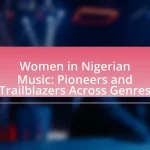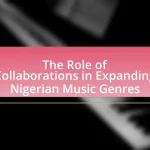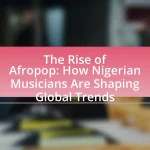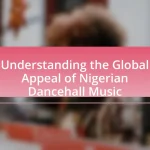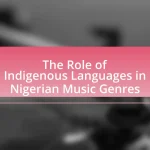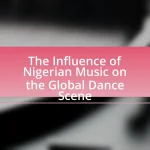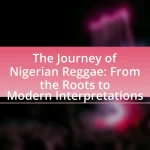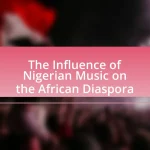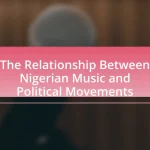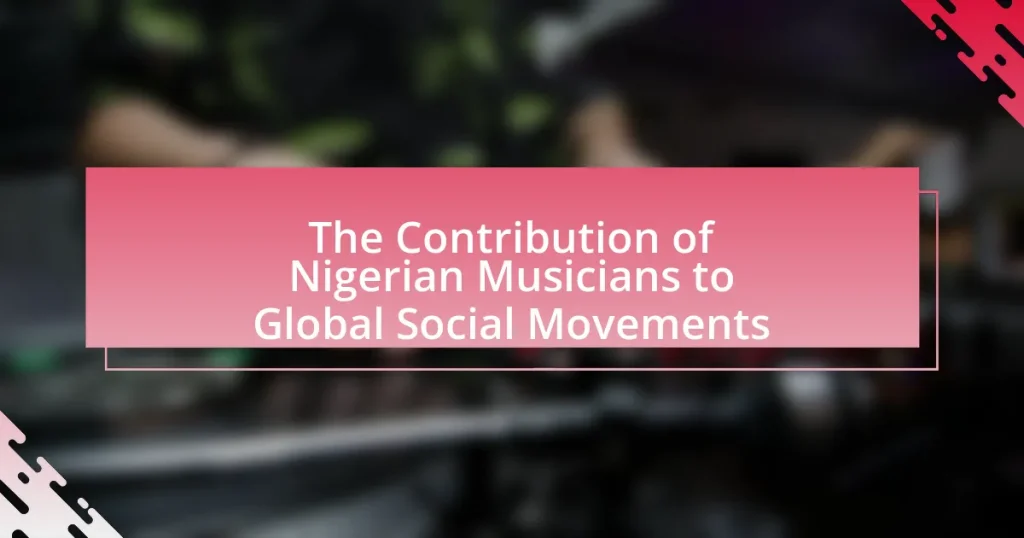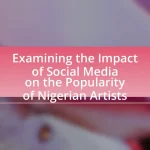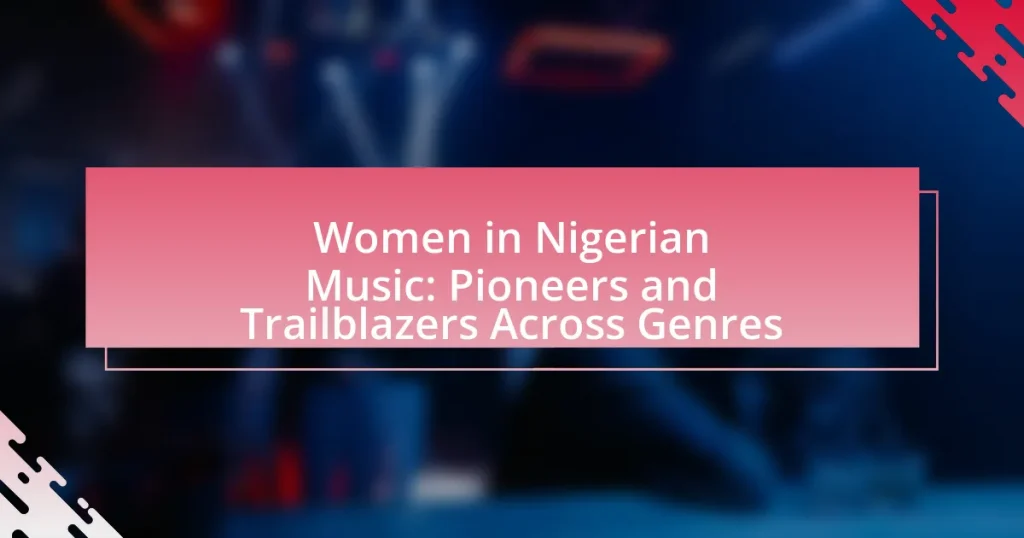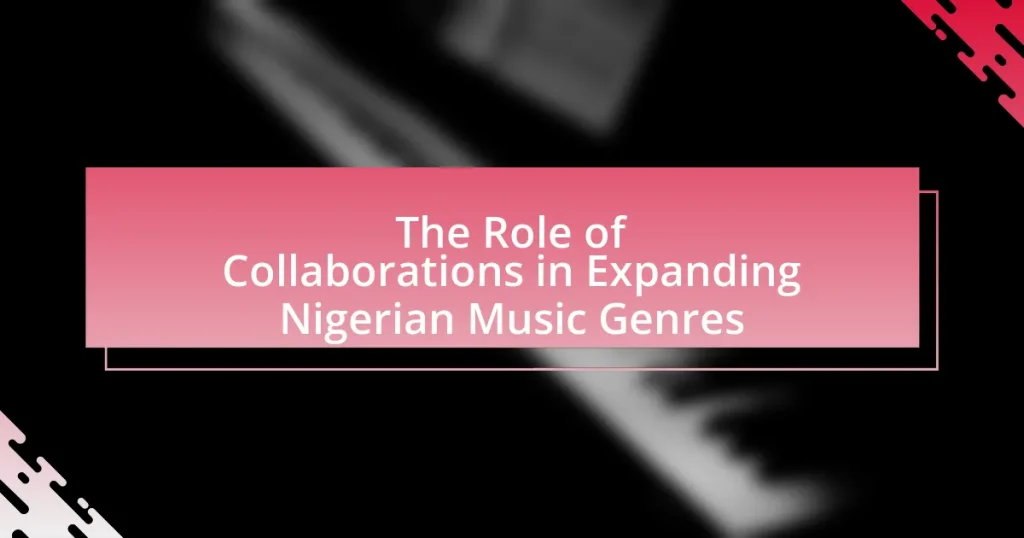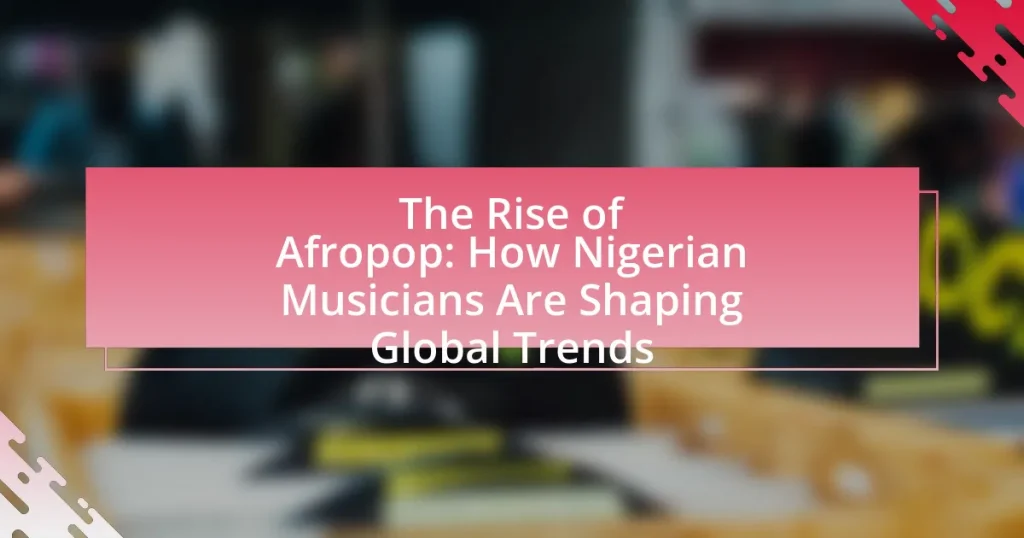Nigerian musicians play a crucial role in global social movements by leveraging their platforms to raise awareness about social issues, advocate for change, and inspire activism. Historical figures like Fela Kuti and contemporary artists such as Burna Boy and Wizkid have addressed topics like political corruption, police brutality, and human rights abuses through their music, influencing both local and international discourse. The article explores the historical context of this activism, the themes prevalent in their music, and the impact of social media in amplifying their messages. It also highlights notable examples of musicians contributing to social movements and discusses the challenges they face in their advocacy efforts.
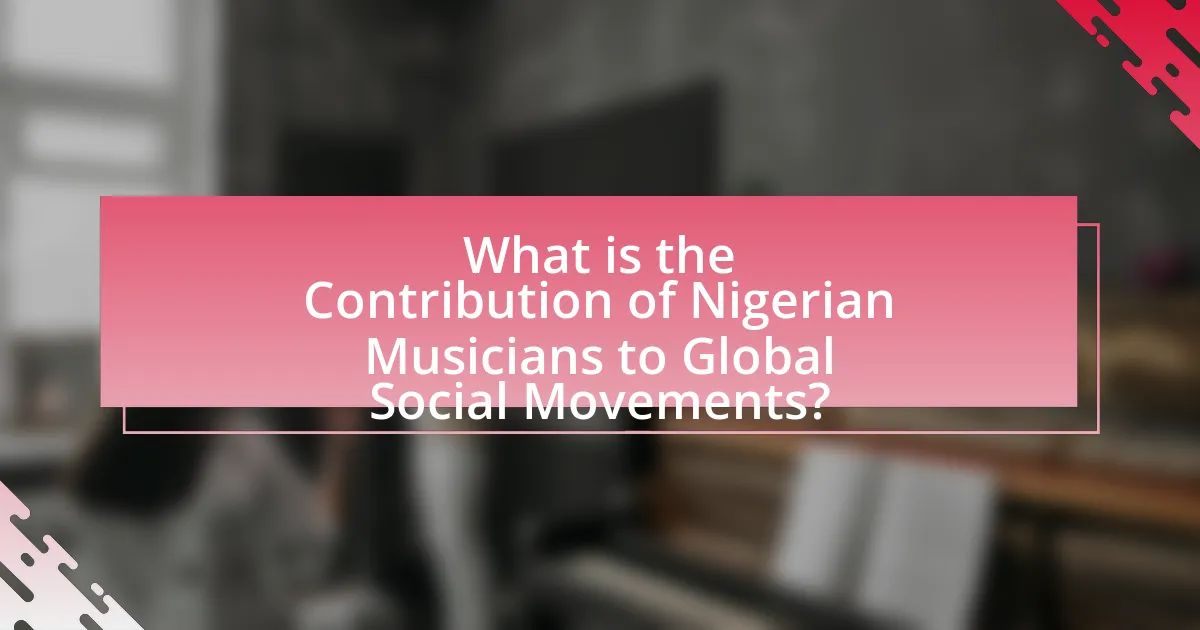
What is the Contribution of Nigerian Musicians to Global Social Movements?
Nigerian musicians significantly contribute to global social movements by using their platforms to raise awareness about social issues, advocate for change, and inspire activism. For instance, artists like Fela Kuti pioneered the Afrobeat genre while addressing political corruption and human rights abuses in Nigeria, influencing global discourse on governance and social justice. More recently, musicians such as Burna Boy and Wizkid have utilized their music to highlight issues like police brutality and the #EndSARS movement, which gained international attention and solidarity. Their songs often serve as anthems for protests, mobilizing youth and fostering a sense of global community around shared struggles for justice and equality. This impact is evidenced by the widespread sharing of their music on social media platforms, which amplifies their messages and connects local issues to global audiences.
How have Nigerian musicians influenced social change globally?
Nigerian musicians have significantly influenced social change globally by using their platforms to address issues such as corruption, human rights, and social justice. For instance, artists like Fela Kuti pioneered the Afrobeat genre, which combined music with political activism, directly challenging government corruption and advocating for democracy in Nigeria during the 1970s and 1980s. His music inspired global movements for social justice, influencing artists worldwide to incorporate political themes into their work. Additionally, contemporary musicians like Burna Boy and Wizkid have raised awareness about the #EndSARS movement, which protests police brutality in Nigeria, garnering international attention and support. This global reach is evidenced by Burna Boy’s Grammy Award win, which highlighted African issues on a worldwide stage, further solidifying the role of Nigerian musicians as catalysts for social change.
What historical context supports the role of Nigerian musicians in social movements?
Nigerian musicians have historically played a pivotal role in social movements, particularly during periods of political unrest and social change. The Nigerian Civil War (1967-1970) and subsequent military regimes fostered a climate where music became a powerful tool for protest and social commentary. Artists like Fela Kuti used Afrobeat to address issues such as corruption, human rights abuses, and the struggles of the marginalized, directly influencing public opinion and mobilizing activism. Additionally, the End SARS movement in 2020 saw contemporary musicians leveraging social media and their platforms to advocate against police brutality, demonstrating the ongoing relevance of music in shaping social discourse and driving change in Nigeria.
How do Nigerian musicians use their platforms to advocate for social issues?
Nigerian musicians use their platforms to advocate for social issues by leveraging their music, social media presence, and public appearances to raise awareness and mobilize support. For instance, artists like Burna Boy and Wizkid have addressed issues such as police brutality and the #EndSARS movement through their songs and social media campaigns, effectively reaching millions of followers. Additionally, musicians often collaborate with NGOs and participate in protests, amplifying their messages and encouraging civic engagement. This approach not only highlights pressing social concerns but also fosters a sense of community and solidarity among their audiences, as seen during the widespread protests against police violence in Nigeria in 2020, where music played a crucial role in uniting voices for change.
Why is the music of Nigerian artists significant in global social movements?
The music of Nigerian artists is significant in global social movements because it serves as a powerful tool for advocacy, raising awareness, and mobilizing communities. Nigerian musicians like Fela Kuti and Burna Boy have addressed social issues such as corruption, police brutality, and human rights abuses through their lyrics and performances. For instance, Fela Kuti’s Afrobeat music became synonymous with political activism in the 1970s, directly challenging the Nigerian government and inspiring movements across Africa. More recently, Burna Boy’s song “Anybody” became an anthem for the #EndSARS protests against police brutality in Nigeria, resonating with global audiences and amplifying calls for justice. This ability to connect local struggles with global narratives enhances the impact of their music, making it a significant force in social movements worldwide.
What themes are prevalent in the music of Nigerian musicians that resonate with social movements?
Nigerian musicians often address themes of social justice, political corruption, and human rights in their music, which resonate strongly with social movements. For instance, artists like Fela Kuti have historically used their music to critique government oppression and advocate for democracy, particularly during Nigeria’s military regimes. This theme of resistance against authoritarianism is prevalent in songs like “Zombie,” which directly challenges the military’s brutality. Additionally, contemporary musicians such as Burna Boy and Wizkid incorporate themes of identity and empowerment, reflecting the struggles of the Nigerian youth and the broader African diaspora. Their songs often highlight issues like police brutality, as seen in Burna Boy’s “Monsters You Made,” which addresses systemic violence and calls for accountability. These thematic elements not only connect with local social movements but also resonate on a global scale, influencing international conversations about justice and equality.
How do collaborations between Nigerian musicians and international artists amplify their message?
Collaborations between Nigerian musicians and international artists amplify their message by expanding their reach and enhancing cultural exchange. When Nigerian artists partner with global figures, they gain access to broader audiences, allowing their social and political messages to resonate across diverse demographics. For instance, the collaboration between Burna Boy and American artist Beyoncé on the track “Ja Ara E” not only showcased Afrobeat to a global audience but also highlighted themes of empowerment and resilience, aligning with social movements like Black Lives Matter. This synergy fosters a cross-cultural dialogue that elevates the significance of their messages, making them more impactful and relatable on an international scale.
What are some notable examples of Nigerian musicians contributing to social movements?
Notable examples of Nigerian musicians contributing to social movements include Fela Kuti, who used his music to protest against government corruption and human rights abuses in Nigeria during the 1970s and 1980s. His Afrobeat genre became a powerful tool for political activism, exemplified by songs like “Zombie,” which criticized the military regime. Another significant figure is Burna Boy, who has actively supported the #EndSARS movement against police brutality in Nigeria, using his platform to raise awareness and mobilize youth through his music and social media presence. Additionally, Tiwa Savage has been vocal about women’s rights and gender equality, participating in campaigns that address these issues. These musicians not only create impactful music but also leverage their influence to advocate for social change, demonstrating the intersection of art and activism in Nigeria.
Which specific songs or albums have had a significant impact on social issues?
“Zombie” by Fela Kuti significantly impacted social issues by addressing military oppression in Nigeria. Released in 1976, the song critiques the Nigerian military’s brutality and has become an anthem for resistance against authoritarian regimes. Similarly, “This Is Nigeria” by Falz, released in 2018, highlights corruption, poverty, and social injustice, resonating with the youth and sparking conversations about governance and accountability. Both songs exemplify how Nigerian musicians use their platforms to influence social movements and advocate for change.
How have Nigerian musicians participated in global campaigns or movements?
Nigerian musicians have actively participated in global campaigns and movements by using their platforms to raise awareness on social issues, advocate for change, and mobilize support. For instance, artists like Burna Boy and Wizkid have contributed to the Black Lives Matter movement, using their music and social media presence to highlight racial injustice and police brutality. Additionally, the #EndSARS movement against police brutality in Nigeria saw significant involvement from musicians such as Falz and Tiwa Savage, who organized protests and used their songs to amplify the message. These actions demonstrate how Nigerian musicians leverage their influence to engage in global social movements, fostering solidarity and encouraging activism both locally and internationally.
How do Nigerian musicians engage with their communities to promote social change?
Nigerian musicians engage with their communities to promote social change through activism, awareness campaigns, and community outreach initiatives. For instance, artists like Fela Kuti historically used their music to address political corruption and social injustices, while contemporary musicians such as Burna Boy and Wizkid leverage their platforms to raise awareness about issues like police brutality and the #EndSARS movement. These musicians often collaborate with NGOs and participate in events that focus on education, health, and human rights, effectively mobilizing their fan base to advocate for change. Additionally, they utilize social media to amplify their messages, reaching a global audience and fostering solidarity around social issues.
What challenges do Nigerian musicians face in advocating for social movements?
Nigerian musicians face significant challenges in advocating for social movements, primarily due to government censorship and repression. The Nigerian government has a history of suppressing dissent, which can lead to harassment, arrest, or violence against artists who speak out. For instance, the #EndSARS protests against police brutality in 2020 saw musicians like Falz and Runtown facing threats for their vocal opposition. Additionally, financial constraints limit the ability of musicians to sustain long-term advocacy efforts, as many rely on commercial success to fund their projects. The lack of a unified platform for collaboration among artists further complicates their ability to mobilize effectively for social change.
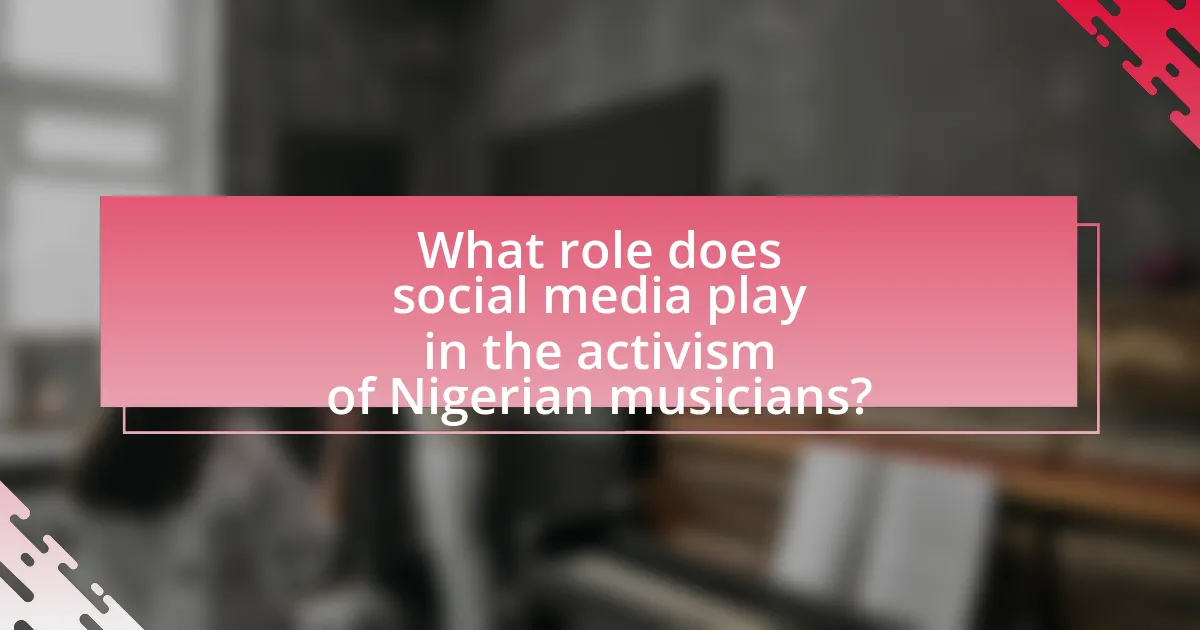
What role does social media play in the activism of Nigerian musicians?
Social media serves as a crucial platform for Nigerian musicians to amplify their activism and engage with social issues. By utilizing platforms like Twitter, Instagram, and Facebook, these artists can reach a wide audience, mobilize support, and raise awareness about pressing societal challenges such as police brutality, corruption, and human rights violations. For instance, during the #EndSARS movement in 2020, Nigerian musicians like Wizkid and Burna Boy used their social media accounts to share information, organize protests, and encourage their followers to participate, significantly influencing public discourse and action. This demonstrates that social media not only facilitates communication but also empowers musicians to play an active role in shaping social movements and advocating for change in Nigeria.
How do Nigerian musicians utilize social media to spread their messages?
Nigerian musicians utilize social media to spread their messages by engaging directly with their audience, promoting social causes, and amplifying their music’s reach. They leverage platforms like Twitter, Instagram, and Facebook to share content that raises awareness about issues such as police brutality, corruption, and social justice, particularly highlighted during the #EndSARS movement in 2020. This movement saw artists like Burna Boy and Wizkid using their platforms to mobilize support and inform followers about protests, demonstrating the power of social media in shaping public discourse and driving social change.
What platforms are most effective for Nigerian musicians in reaching their audience?
Social media platforms, particularly Instagram, Twitter, and TikTok, are the most effective for Nigerian musicians in reaching their audience. These platforms allow musicians to engage directly with fans, share content rapidly, and promote their music through viral trends. For instance, TikTok has become a significant tool for music promotion, with many songs gaining popularity through user-generated content and challenges. According to a report by the International Federation of the Phonographic Industry (IFPI), social media is a primary source of music discovery for 50% of Nigerian listeners, highlighting its crucial role in audience engagement.
How has social media changed the landscape of activism for Nigerian musicians?
Social media has significantly transformed activism for Nigerian musicians by providing a platform for immediate communication and mobilization. This shift allows artists to engage directly with their audience, share messages, and organize protests, as seen during the #EndSARS movement in 2020, where musicians like Falz and Runtown used their social media presence to amplify calls for police reform. The accessibility of platforms like Twitter and Instagram enables musicians to reach a global audience, fostering solidarity and support for local issues on an international scale. This direct engagement has led to increased visibility for social justice causes, empowering musicians to influence public opinion and policy effectively.
What impact does the global audience have on the activism of Nigerian musicians?
The global audience significantly amplifies the activism of Nigerian musicians by providing a broader platform for their messages and increasing their influence. This expanded reach allows musicians to engage with international issues, drawing attention to local injustices such as police brutality and corruption, exemplified by the global response to the #EndSARS movement in 2020, which saw Nigerian artists like Burna Boy and Wizkid mobilizing support worldwide. The engagement of a global audience not only enhances visibility but also fosters solidarity, as seen in collaborations with international artists and participation in global campaigns, thereby reinforcing the impact of their activism on social movements.
How do international fans influence the social messages conveyed by Nigerian artists?
International fans significantly influence the social messages conveyed by Nigerian artists by amplifying their reach and shaping the narrative around social issues. The engagement of these fans through social media platforms allows Nigerian musicians to gain global visibility, which in turn encourages them to address broader social themes such as corruption, inequality, and human rights in their music. For instance, artists like Burna Boy and Wizkid have used their platforms to speak on issues like police brutality and the End SARS movement, resonating with international audiences who share similar concerns. This cross-cultural dialogue not only enhances the artists’ messages but also fosters a sense of solidarity among fans worldwide, thereby reinforcing the impact of social movements.
What role does cultural exchange play in the activism of Nigerian musicians?
Cultural exchange significantly enhances the activism of Nigerian musicians by facilitating the sharing of ideas, values, and social issues across borders. This exchange allows Nigerian artists to draw inspiration from global movements, integrating diverse perspectives into their music, which amplifies their messages of social justice and change. For instance, the collaboration between Nigerian musicians and international artists, such as the partnership between Burna Boy and American rapper JAY-Z, showcases how cultural exchange can elevate awareness of issues like police brutality and systemic racism. Furthermore, platforms like social media enable Nigerian musicians to reach a global audience, fostering solidarity and support for local causes, as seen during the #EndSARS protests against police violence in Nigeria, where artists used their influence to mobilize both local and international support.
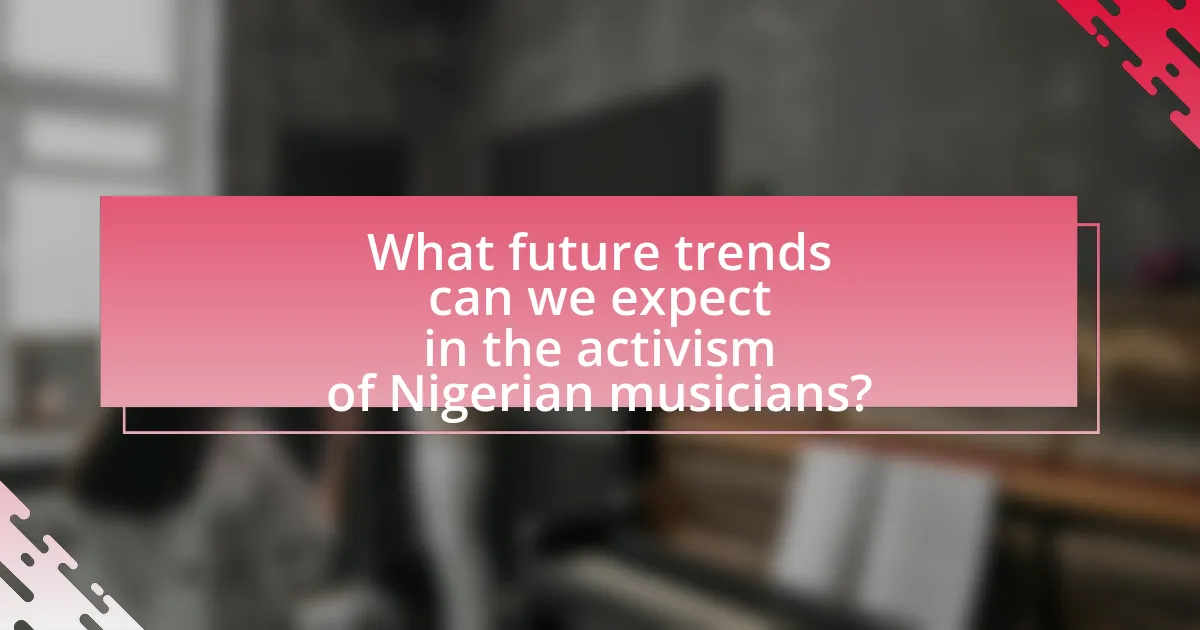
What future trends can we expect in the activism of Nigerian musicians?
Nigerian musicians are expected to increasingly leverage digital platforms for activism, enhancing their reach and engagement with global audiences. This trend is driven by the growing influence of social media, which allows artists to mobilize support for social causes rapidly and effectively. For instance, the #EndSARS movement in 2020 showcased how musicians like Burna Boy and Wizkid utilized platforms like Twitter and Instagram to raise awareness and galvanize action against police brutality in Nigeria. As technology continues to evolve, musicians will likely adopt innovative methods such as virtual concerts and online campaigns to advocate for social justice, environmental issues, and human rights, further solidifying their role in global social movements.
How might the role of Nigerian musicians in global social movements evolve?
The role of Nigerian musicians in global social movements may evolve through increased digital engagement and collaboration with international artists. As platforms like social media amplify their voices, musicians such as Burna Boy and Wizkid have already demonstrated the ability to influence global conversations on issues like police brutality and social justice, particularly during the #EndSARS protests in 2020. This evolution is supported by the growing trend of African music gaining international recognition, which allows Nigerian artists to reach wider audiences and mobilize support for various causes. Furthermore, partnerships with global organizations and participation in international events can enhance their impact, making them pivotal figures in shaping narratives around social change worldwide.
What emerging issues are Nigerian musicians likely to address in their activism?
Nigerian musicians are likely to address issues such as police brutality, corruption, and social justice in their activism. The #EndSARS movement, which protested against police violence and systemic corruption in Nigeria, exemplifies how musicians have mobilized public sentiment and raised awareness through their platforms. Artists like Burna Boy and Wizkid have used their music and social media presence to advocate for change, highlighting the urgent need for reforms in governance and human rights. This activism is rooted in the broader context of Nigeria’s socio-political landscape, where musicians play a crucial role in shaping public discourse and influencing policy.
How can upcoming artists learn from the activism of established Nigerian musicians?
Upcoming artists can learn from the activism of established Nigerian musicians by studying their methods of using music as a platform for social change. Established musicians like Fela Kuti and Burna Boy have effectively addressed political issues and social injustices through their lyrics and public statements, demonstrating the power of art in activism. For instance, Fela Kuti’s Afrobeat genre was not only a musical innovation but also a vehicle for political commentary against the Nigerian government, which inspired many to engage in activism. Similarly, Burna Boy’s song “Destiny” highlights the struggles of the Nigerian youth, encouraging listeners to advocate for their rights. By analyzing these examples, upcoming artists can understand how to blend their artistic expression with social messages, thereby amplifying their impact on societal issues.
What practical steps can Nigerian musicians take to enhance their impact on social movements?
Nigerian musicians can enhance their impact on social movements by actively using their platforms to raise awareness and mobilize support for social issues. They can create music that addresses social injustices, thereby resonating with audiences and inspiring action. For instance, artists like Fela Kuti have historically used their music to critique government policies and advocate for change, demonstrating the power of music as a tool for social commentary. Additionally, musicians can collaborate with activists and organizations to amplify their messages, participate in protests, and leverage social media to reach wider audiences. This multifaceted approach not only engages fans but also fosters a sense of community around social causes, ultimately driving greater impact.
